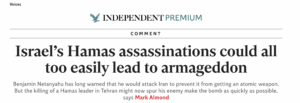There was an unfortunate inevitability to the media’s coverage of the killing of Hamas leader Ismail Haniyeh at a residence in Tehran early Wednesday morning. Reportedly killed in an airstrike, Haniyeh was one of Israel’s most prominent targets following the October 7 attacks and was in the Iranian capital for the inauguration ceremony of Iran’s new president, Masoud Pezeshkian.
In addition to a flurry of analyses suggesting that Israel could be responsible for triggering a regional war, international media also published various ‘explainers’ on Haniyeh, portraying the Hamas political bureau head as a moderating force within the Islamist terrorist group.
HonestReporting called out Reuters on social media over a headline, which was later amended, that absurdly described the Hamas terrorist as “tough-talking” and who was “seen as the more moderate face of Hamas.”
Watch Haniyeh celebrate the murders of 1200 Israelis on October 7 after murdering countless himself and then ask yourself why you trust anything written by @Reuters that calls him a moderate.https://t.co/drHaijJB4Y pic.twitter.com/cTpOqYrcfY
— HonestReporting (@HonestReporting) July 31, 2024
Although the mastermind behind October 7 is Hamas’ Gaza leader Yahya Sinwar, reputable wire agencies like Reuters should not need reminding that there was nothing moderate about Haniyeh’s celebration of the massacre of Israeli civilians and his promise to repeat such atrocities.
The Guardian used similar language, going so far as to suggest some kind of diplomatic prowess on Haniyeh’s part by describing him as a “moderate figure within the [Hamas] movement, one whose role had become vital in sustained diplomatic efforts to secure a ceasefire.”
Apparently for the @guardian, a mass murderer is a moderate, as long as the majority of his victims were Jews. pic.twitter.com/ouPXNVb1aK
— HonestReporting (@HonestReporting) July 31, 2024
The BBC’s Middle East correspondent, Yolande Knell, was widely criticized for a piece that praised the “pragmatic” ways of Haniyeh, claiming he was less hardline than other Hamas leaders despite his “tough rhetoric.”
BBC’s @YolandeKnell describes Haniyeh as “moderate and pragmatic”.
— Stephen Pollard (@stephenpollard) July 31, 2024
Media Portrayal of War-Provoking Israel
The assassination of Haniyeh, which came just hours after the IDF confirmed it had eliminated Hezbollah commander Fuad Shukr, who was responsible for the Majdal Shams rocket attack, will undoubtedly provoke a response from Iran, which described it as a “dangerous escalation.”
It is a skewed narrative that is being parroted by the international media, which has placed disproportionate blame on Israel for escalating tensions in the region, including the New York Times accusing Jerusalem of an “audacious escalation.”
According to @nytimes, targeting 2 arch terrorists is an “audacious escalation.” Didn’t the region already escalate audaciously on October 7 and on Saturday, when Hezbollah fired 100 rockets and murdered 12 kids? pic.twitter.com/S2bfAQ737Y
— HonestReporting (@HonestReporting) July 31, 2024
But the fact is, Israel is not bringing the Middle East to the “brink of all-out war,” as CNN claimed, nor is it provoking “Armageddon,” as suggested in an op-ed in the UK’s Independent. These depictions of Israel as a destabilizing force in the region overlook crucial context. The killing of Hezbollah commander Fuad Shukr came after the group murdered a dozen children in a rocket attack on Israel. These acts of terroristic violence, like the October 7 atrocities, sparked the current conflict.


Ismail Haniyeh’s death may well trigger a wider regional conflagration. If it does, it does not change the fact that he was a genocidal monster, and the world is a better place without him in it.
Liked this article? Follow HonestReporting on Twitter, Facebook, Instagram and TikTok to see even more posts and videos debunking news bias and smears, as well as other content explaining what’s really going on in Israel and the region. Get updates direct to your phone. Join our WhatsApp and Telegram channels!
Photo by Abed Rahim Khatib/Shutterstock


